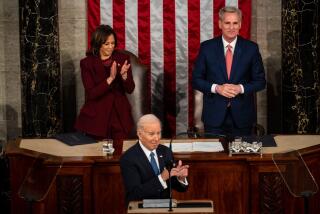The Headache of Health Reform : Advice to Clinton: Proceed, but with caution
- Share via
Gov. Pete Wilson had it right when he said that President Clinton’s speech to a meeting of governors was a clearheaded description of the health care problem in the United States. The President has shown himself adept at pinpointing what ails a health care system that eats up 14% of the gross national product. But when Clinton fully outlines his health care reform program for Congress next month, he had better have answers to several key specific funding--read tax--questions, as well as a bipartisan political game plan to get reform through a leery Congress. Otherwise, the battle over health care reform could make the recent tug of war over the budget look like child’s play.
A LESSON LEARNED: There’s some indication that Clinton already is keenly aware of the potential political pitfalls. He has heard the Republican fear that health care reform would equal little more than more taxes and new burdens on business. In response, the White House conceded that the reforms should be phased in, over five to seven years. Clinton aides told reporters that if there’s one thing they learned from the budget battle, it is the need to quickly identify opponents and take them on. Sure, the need to “get tough” with opponents is one partisan lesson that could be taken from the budget battle; another is that a successful Administration must use both the carrot and the stick with Congress. Perhaps even more crucial than identifying opponents, the President must identify potential supporters, both Democrats and Republicans. With most of medical insurance still tied to having a job, states hit hard by massive job loss, including California, offer a wellspring of potential congressional support for health care reform. More and more House and Senate members have huge middle-class constituencies that, for the first time, know the trauma of living without access to good medical care.
That said, Clinton still has many difficult questions to answer when he comes before Congress next month. Even some within the Administration are skeptical that extending health care coverage to the 37 million uninsured can be done without new broad-based taxes. If savings from reducing paperwork and eliminating duplication will finance such a fundamental reform, Clinton will need to spell out just how and why in a plain and logical way. A lot of the job of selling Congress, of course, is selling the American people, and the American people typically are suspicious of proposals that offer, as a Southern saying goes, “too much sugar for a dime.”
MILES TO GO: The key point of contention may be the cost to business. Big business would be expected to pay a 7% payroll tax and small businesses a 3.5% tax. Can the U.S. economy withstand it? Considering the spiraling costs of health care to business and the economy in general, Clinton will argue that the nation can’t afford not to institute reform. He’s right in identifying the problem. But has he learned enough from his skirmishes with Congress this year to appreciate that identifying the problem is not even half the battle?
More to Read
Sign up for Essential California
The most important California stories and recommendations in your inbox every morning.
You may occasionally receive promotional content from the Los Angeles Times.












